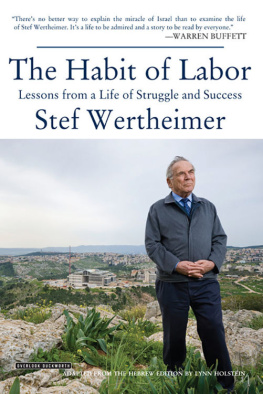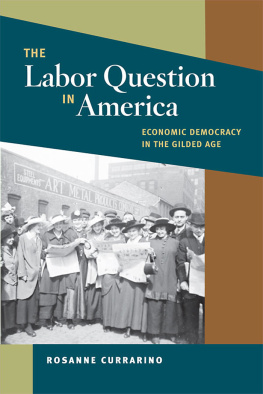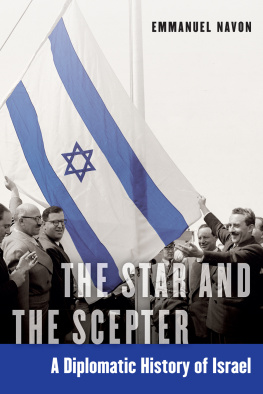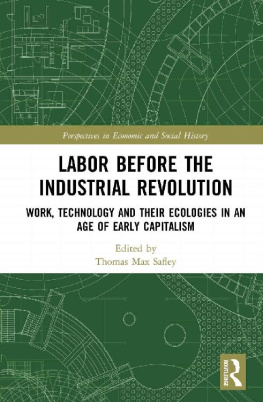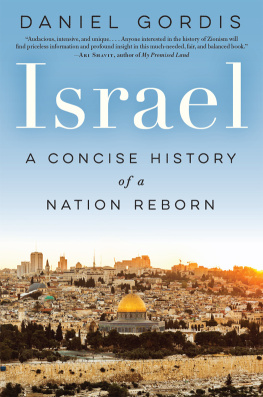The Habit of Labor
Lessons from a Life of Struggle and Success
Stef Wertheimer

WITH 32 BLACK-AND-WHITE PHOTOGRAPHS

F orced to flee Nazi Germany with his family at age 10, Stef Wertheimer came to British Palestine in the late 1930s. He was expelled from school, learned a trade through apprenticeship, and played a meaningful role in Israels War of Independence. He also started a companyISCARthat began in a shed and ultimately made him one of the worlds great self-made industrialists.
In The Habit of Labor, a major bestseller upon its first publication in Israel, Stef Wertheimer shares the lessons he learned from a life of struggle and, ultimately, great success, in one of the worlds newest industrial powers. Both a pragmatist and a visionary, Wertheimer has devoted much of his life to promoting Jewish and Arab economic development through innovative educational and vocational programs, along with the establishment of a series of thriving industrial parks in Israel and in Turkey. The future of Israel, and all countries, he believes, is not in military might or diplomatic alliances, but in their growing economic clout deriving in part from apprenticeships and vocational education, both, interestingly, rooted in German tradition.
This edition first published in hardcover in the United States and the United Kingdom in 2015 by Overlook Duckworth, Peter Mayer Publishers, Inc.
N EW Y ORK
141 Wooster Street
New York, NY 10012
www.overlookpress.com
For bulk and special sales, please contact ,
or write us at the above address
L ONDON
30 Calvin Street
London E1 6NW
www.ducknet.co.uk
Copyright 2015 by Stef Wertheimer
All rights reserved. No part of this publication may be reproduced or transmitted in any form or by any means, electronic or mechanical, including photocopy, recording, or any information storage and retrieval system now known or to be invented, without permission in writing from the publisher, except by a reviewer who wishes to quote brief passages in connection with a review written for inclusion in a magazine, newspaper, or broadcast.
Disclaimer: The events and conversations described in this book are derived solely from the authors recollections. The author has made every attempt to verify all facts against existing records, but any errors are the product of misremembrance rather than ill intent.
ISBN: 978-1-4683-1322-2
To all of my loved ones and friends.
Tearing us from our roots, from our natural soil, from the Land of Israel, and the subjugation and persecution in the exile, which first of all alienated us from all nature, from all natural life, from all productive work, turned us into a parasitic people our national spirit, our national identity, had been sustained solely by the remnants of the past or from the table of others.
Now, in our aspiration to return to life, for national revival, both human and personal, we must correct all this and to a great extent create all this from the beginning. We must return to nature, to independent work and to our own language. First of all, of course, we must aspire to return to our land, to strike roots in the Land of Israel through our own working of the soil and to revive our national language.
A.D. G ORDON , from The Nation and Work
Special edition, 1956, published by the Haifa Workers Council,
the Zionist Library, edited by S.H. Bergman and L. Shohat,
p. 263. Translation by Anett Daffan
CONTENTS
T his autobiography, which Stef Wertheimer narrated to the Israeli journalist Yitzhak Ben-Ner, was published in Hebrew in January 2011 under the title A Man Next to the Machine. It was on the best-seller list for half a year. Ira Moskowitz skillfully translated the book to English.
This English version of the book is an adaptation, not a strict translation. While it follows much of the original text, it also updates the book and covers more of the projects Stef Wertheimer undertook outside of Israel that English-speaking readers might find of interest. It now includes several entirely new chapters. One discusses his concept for a new initiative for the Middle East that is akin to the Marshall Plan; Stef and I worked very hard to advance this project in Washington, DC, from 2001 to 2004. Another includes a broader discussion of his collaborative technical education initiatives with the government of Baden-Wrttemberg in Germany, and another is a chapter that outlines Stefs suggestions for budding entrepreneurs. Yet another new feature is a timeline at the end of this book that shows Stefs life in context with the international and domestic events that have shaped Israel.
This version also brings readers up to date on what I consider to be Stefs most remarkable skill: his ability to transform former foes into allies. He has been honored for his outstanding service to his country, for his firms innovative products, for his vision in advancing entrepreneurship and exports through his industrial parks, for promoting crucial foreign investment in Israel, and for the inspiration he has provided to the next generation. By using both his hands and his head he has become one of the wealthiest individuals in Israel. But in this achievement-filled life, one quality stands out above all: his ability to reverse history, turning tragic events into constructive projects.
In 1936, shortly before the Nazi regime began its most malevolent practices, ten-year-old Stef and his family fled their small village of Kippenheim in the southwestern corner of Germany near Switzerland and France, where the Wertheimers had lived since the end of the eighteenth century. It was a time of trauma, of dislocation and relocation in the austere and demanding landscape of Palestine, then under British control.
By 2009, however, things were very different. In the intervening decades Stef had built firms in Germany and had eventually become partners with that government to introduce their successful system of education into Israel. The boy who had fled for his life, now a successful man, returned to a standing ovation in the parliament of Baden-Wrttemberg, the seat of government for the region hed lived in as a young boy. A day later, in an official ceremony, he was awarded Baden-Wrttembergs highest honor, the Verdienstmedaille, or Order of Merit Medal. And in May 2012, German president Joachim Gauck bestowed on him that nations highest honor, the Grosse Verdienstkreuz, the Order of Merit, Grand Cross, at a ceremony at the King David Hotel in Jerusalem; this large, red enameled ornament, suspended from a red striped grosgrain ribbon, embodies the unexpected course that a life can follow.
In the Middle East, Stef has also made peace with former enemies. In 1952less than five years after the Israeli War of Independence endedhe began to include Arabs and those from other minority sectors within his workforce. The enormous success of the precision cutting tools firm that he built, ISCAR, is due in part to his insistence on using the talents of all sectors of this country. He has also conferred with local Muslim leaders from Jordan and Turkey and in the Palestinian Authority to promote a more secure future through industrialization.
Certainly Stef will always remember the tragic fate of his fellow Jews under the Nazi reign of terror, and he will never forget his many young friends who fell in the war for Israels independence. Nonetheless, he has been able to extend his hand in fruitful partnership with a new generation of Germans and Arabs, an act that should serve to inspire others in any region that struggles for a peaceful settlement to ongoing ethnic conflict.
Next page
